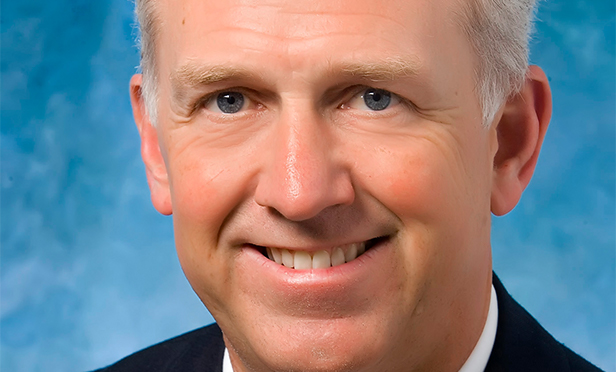
CLARK, NJ—New Jersey's recent gasoline tax increase of 23 cents a gallon, which will pump $2 billion into transportation infrastructure improvements, will return some $4.7 billion in increased economic output, says the head of one of the state's largest business organizations.
The infrastructure investments will generate an additional $305 million in increased economic activity in the real estate sector, says Michele Siekerka, president and CEO of the NJ Business & Industry Association. Siekerka was a keynote speaker at an Economic Outlook conference held by the New Jersey Bank Marketing Association in Clark, NJ, Thursday.
“We're forced to make up for the failure of past administrations for decades to have the courage to continue the important investment in infrastructure,” she says. “What do we get for 23 cents? We're going to have a $2 billion per year spend times six years. For that, we're going to get back $4.73 billion in economic output. About 35,000 jobs, $1.44 billion in wages per year for the $2 billion spend. So of that, you're going to get another $93 million in income taxes coming into the rolls, $16 million in payroll tax, and about $40 million in sales tax. That creation of jobs is going to stimulate our economy, and we're going to see that over the next six years.”
Sectors that will benefit from the economic stimulus are construction, manufacturing, and real estate, she says. In addition to the $305 million in increased real estate activity, she says manufacturing output will grow by $533 million.
Financial services, insurance, and real estate are seen as “hot” industries in the NJBIA's business outlook survey, Siekerka says.
“The good news is that we're coming off of three solid years of slow, steady growth,” she says. “The vast majority expect they are going to see a continued increase in sales, profits and jobs.”
Rising costs of doing business are the biggest concern among New Jersey companies, and NJBIA is hoping to advocate for business-friendly policies in the state, particularly around minimum wage levels, paid sick leave, and healthcare costs, she says.

Banks in New Jersey should be optimistic, says John McWeeney, president of NJBankers, the leading trade association of commercial banks in the state. McWeeney, a former Bank of America executive, described a business environment featuring strong banks poised to do well in the coming year.
There are 89 banks based in New Jersey, with total capitalization of $15.5 billion, deposits of $106 billion, loads of $96.1 billion, and net income of $768.2 million, he says.
“New Jersey banks are well-positioned to withstand any speed bumps in the economy,” he says. While he says it's too early to tell if bank regulations will be eased, he says he believes the Dodd-Frank law probably will not be repealed. “There's going to be some tweaking,” he says.
Interest rates are likely to rise 100-150 basis points in the coming year, McWeeney says, something he regards as good for the economy and banks in particular.

CLARK, NJ—New Jersey's recent gasoline tax increase of 23 cents a gallon, which will pump $2 billion into transportation infrastructure improvements, will return some $4.7 billion in increased economic output, says the head of one of the state's largest business organizations.
The infrastructure investments will generate an additional $305 million in increased economic activity in the real estate sector, says Michele Siekerka, president and CEO of the NJ Business & Industry Association. Siekerka was a keynote speaker at an Economic Outlook conference held by the New Jersey Bank Marketing Association in Clark, NJ, Thursday.
“We're forced to make up for the failure of past administrations for decades to have the courage to continue the important investment in infrastructure,” she says. “What do we get for 23 cents? We're going to have a $2 billion per year spend times six years. For that, we're going to get back $4.73 billion in economic output. About 35,000 jobs, $1.44 billion in wages per year for the $2 billion spend. So of that, you're going to get another $93 million in income taxes coming into the rolls, $16 million in payroll tax, and about $40 million in sales tax. That creation of jobs is going to stimulate our economy, and we're going to see that over the next six years.”
Sectors that will benefit from the economic stimulus are construction, manufacturing, and real estate, she says. In addition to the $305 million in increased real estate activity, she says manufacturing output will grow by $533 million.
Financial services, insurance, and real estate are seen as “hot” industries in the NJBIA's business outlook survey, Siekerka says.
“The good news is that we're coming off of three solid years of slow, steady growth,” she says. “The vast majority expect they are going to see a continued increase in sales, profits and jobs.”
Rising costs of doing business are the biggest concern among New Jersey companies, and NJBIA is hoping to advocate for business-friendly policies in the state, particularly around minimum wage levels, paid sick leave, and healthcare costs, she says.

Banks in New Jersey should be optimistic, says John McWeeney, president of NJBankers, the leading trade association of commercial banks in the state. McWeeney, a former
There are 89 banks based in New Jersey, with total capitalization of $15.5 billion, deposits of $106 billion, loads of $96.1 billion, and net income of $768.2 million, he says.
“New Jersey banks are well-positioned to withstand any speed bumps in the economy,” he says. While he says it's too early to tell if bank regulations will be eased, he says he believes the Dodd-Frank law probably will not be repealed. “There's going to be some tweaking,” he says.
Interest rates are likely to rise 100-150 basis points in the coming year, McWeeney says, something he regards as good for the economy and banks in particular.
© Touchpoint Markets, All Rights Reserved. Request academic re-use from www.copyright.com. All other uses, submit a request to [email protected]. For more inforrmation visit Asset & Logo Licensing.







